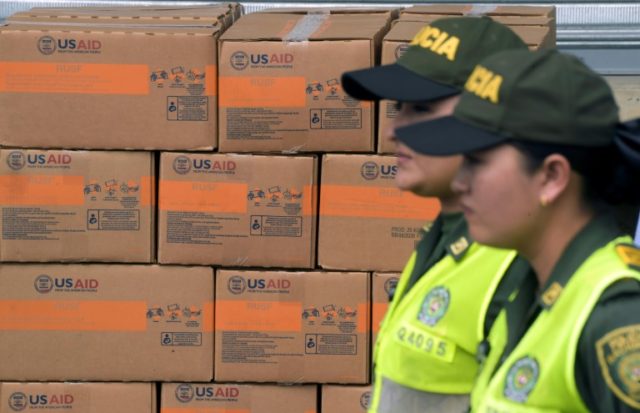Delcy Rodríguez, who officially served as vice president of Venezuela until the inauguration of interim President Juan Guaidó in January but has refused to step down, warned Venezuelans on Tuesday that shipments of food aid from the United States were “carcinogenic” and part of a plot to kill them.
Rodríguez has also served as foreign minister and head of the fraudulent legislative body the “national constituent assembly,” which dictator Nicolás Maduro created after his United Socialist Party of Venezuela (PSUV) decisively lost legislative elections in 2015, making her one of the most prominent and powerful socialists in the country.
The United States sent $20 million in food aid to the Venezuela-Colombia border this month after Guaidó requested food and medicine from the international community, his first act as interim president. Venezuela is currently facing the worst humanitarian crisis in its history after two decades of socialist rule, prompting millions to flee the country and flood neighboring nations’ borders.
Maduro, who still controls the military, ordered a blockade on the Tienditas bridge connecting Venezuela to Colombia last week, preventing food and medicine from entering the country. The dictator has insisted that the aid hides a secret American invasion to colonize the country. Rodríguez took the argument further in remarks Tuesday, insisting Americans were looking to kill as many Venezuelans as possible.
“Something that should alarm us as a people is that the humanitarian aid comes contaminated and poisoned,” she said during a press conference. “It is carcinogenic. Several scientific studies have proven that the … United States is looking to poison our people with chemicals. We could call them biological weapons.”
Rodríguez did not cite any of the alleged “scientific” studies she claims prove the U.S. aid is poisoned, nor did she explain how Venezuelan government scientists tested the food given that they have not accepted custody of any of it. She went on to call the delivery of the aid to Cúcuta, the Colombian town on the Venezuelan border, as a “cheap show” meant to deceive Venezuelans into thinking the United States supports their freedom.
Her comments also appear to contradict a statement from Maduro himself on Wednesday, who said he would not use the military to prevent Venezuelans from bringing humanitarian aid into the country through the border if they chose to make a “human chain” and pass it down into the country. Maduro did not mention any alleged poison or suggest to Venezuelans not to eat the food.
Maduro did repeat, however, a claim that Rodríguez has repeatedly made about Venezuela that every human rights organization with access to the situation the ground there has denounced as false: that Venezuelans are not lacking access to food.
“We have problems, yes. But Venezuela is not a country with hunger, it has high levels of access to food,” Maduro asserted.
In one of her most prominent moments on the international stage in 2017, Rodríguez asserted as head of the “constituent assembly,” “There is no hunger in Venezuela. There is only will. There is no humanitarian crisis in Venezuela … only love.”
Prior to that, Rodríguez, as foreign minister, starred in an embarrassing diplomatic display in 2016 in which the South American trade bloc Mercosur expelled Venezuela for its human rights violations. Rodríguez refused to acknowledge the expulsion and attempted to physically barrel through security into the Mercosur meeting, threatening to hop into the meeting through the window if police kept blocking her entry.
Rodríguez also once asserted that the U.S. dollar “does not exist.”
The socialist regime’s insistence that Venezuelans have access to food does not align with the evidence presented by Venezuelan refugees and NGOs working to track the situation on the ground. In 2016, before Rodríguez claimed that “no hunger” existed in the country, studies found that 15 percent of Venezuelans relied on eating garbage to survive. By November 2018, 80 percent of Venezuelans did not have access to the amount of food necessary to survive on a daily basis. The average Venezuelan involuntarily lost 24 pounds in 2017, the last year for which data is available.
The U.S. State Department, in its announcement it would sent $20 million in food aid in response to Guaidó’s request, acknowledged that reality.
“Former President Nicolas Maduro’s systematic economic mismanagement, corruption, and violent oppression have caused severe shortages of food and medicine and needless human suffering, resulting in an exodus of millions of Venezuelans to neighboring countries,” the State Department noted.

COMMENTS
Please let us know if you're having issues with commenting.